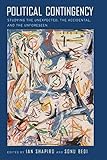Political Contingency : Studying the Unexpected, the Accidental, and the Unforeseen / ed. by Ian Shapiro, Sonu Bedi.
Material type: TextPublisher: New York, NY : New York University Press, [2007]Copyright date: ©2007Description: 1 online resourceContent type:
TextPublisher: New York, NY : New York University Press, [2007]Copyright date: ©2007Description: 1 online resourceContent type: - 9780814740965
- 9780814708828
- Causation -- Political aspects
- Imaginary histories
- Political science -- Methodology
- World politics -- 1989-
- POLITICAL SCIENCE / History & Theory
- That
- This
- accidental
- collection
- contingency
- essays
- examines
- fashion
- original
- phenomena
- political
- politics
- significance
- study
- systematic
- unexpected
- unknowable
- 320.01 22
- online - DeGruyter
| Item type | Current library | Call number | URL | Status | Notes | Barcode | |
|---|---|---|---|---|---|---|---|
 eBook
eBook
|
Biblioteca "Angelicum" Pont. Univ. S.Tommaso d'Aquino Nuvola online | online - DeGruyter (Browse shelf(Opens below)) | Online access | Not for loan (Accesso limitato) | Accesso per gli utenti autorizzati / Access for authorized users | (dgr)9780814708828 |
Browsing Biblioteca "Angelicum" Pont. Univ. S.Tommaso d'Aquino shelves, Shelving location: Nuvola online Close shelf browser (Hides shelf browser)

|

|

|

|

|

|

|
||
| online - DeGruyter Becoming Bicultural : Risk, Resilience, and Latino Youth / | online - DeGruyter The History of the Catholic Church in Latin America : From Conquest to Revolution and Beyond / | online - DeGruyter The American Jesuits : A History / | online - DeGruyter Political Contingency : Studying the Unexpected, the Accidental, and the Unforeseen / | online - DeGruyter Divide and Deal : The Politics of Distribution in Democracies / | online - DeGruyter Irving Howe : A Life of Passionate Dissent / | online - DeGruyter Muslim American Youth : Understanding Hyphenated Identities through Multiple Methods / |
restricted access online access with authorization star
http://purl.org/coar/access_right/c_16ec
History is replete with instances of what might, or might not, have been. By calling something contingent, at a minimum we are saying that it did not have to be as it is. Things could have been otherwise, and they would have been otherwise if something had happened differently. This collection of original essays examines the significance of contingency in the study of politics. That is, how to study unexpected, accidental, or unknowable political phenomena in a systematic fashion. Yitzhak Rabin is assassinated. Saddam Hussein invades Kuwait. Hurricane Katrina hits New Orleans. How might history be different had these events not happened? How should social scientists interpret the significance of these events and can such unexpected outcomes be accounted for in a systematic way or by theoretical models? Can these unpredictable events be predicted for? Political Contingency addresses these and other related questions, providing theoretical and historical perspectives on the topic, empirical case studies, and the methodological challenges that the fact of contingency poses for the study of politics.Contributors: Sonu Bedi, Traci Burch, Jennifer L. Hochschild, Gregory A. Huber, Courtney Jung, David R. Mayhew, Philip Pettit, Andreas Schedler, Mark R. Shulman, Robert G. Shulman, Ian Shapiro, Susan Stokes, Elisabeth Jean Wood, and David Wootton
Mode of access: Internet via World Wide Web.
In English.
Description based on online resource; title from PDF title page (publisher's Web site, viewed 01. Nov 2023)


